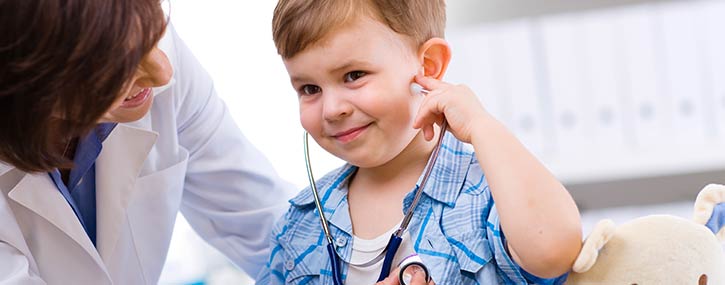When Should a Child See an Allergist?
If you are noticing your child showing symptoms of allergies to certain things or during allergy season, contact our clinic to schedule a pediatric allergy test to be completed or book an appointment at Allergy & Asthma Center today. We have convenient locations to serve you in Lawrenceville GA, Atlanta GA, and Conyers GA.




Table of Contents:
What are pediatric allergies?
When should a child see an allergist?
What age do allergies start in kids?
How is an allergy test done on a child?
Ready to End the Guesswork? How quickly can I get allergy testing for my child at Allergy & Asthma Center?
Pediatric allergies are issues within the immune system. Most allergic reactions occur when the immune system reacts to what are considered “false alarms”. Normally, the human body will defend itself against harmful things like bacteria and viruses. However, the defenses can violently attack mild things including pollen, dust, or mold.
Allergens are mostly harmless, but if a child has an allergy, the body will think the allergens are harmful and try to defend itself. The body will do this by attacking the allergens with antibodies known as immunoglobulin E. The antibodies are attached to cells known as mast cells, these allergens will stick to the antibodies, which will make the mast cells release chemicals like histamine, and other chemicals which cause allergic reactions to occur.
When these chemicals begin to irritate the nearby nasal tissues, which can cause nasal allergy symptoms. When this occurs within the lung’s breathing tubes, it can cause issues including wheezing and coughing. When the reaction involves the entire body, it can become a severe allergic reaction.
If you are beginning to notice allergy symptoms arising in your child including a runny nose during pollen season, or even hives after eating specific foods, you should look into getting an allergy test for them.
While allergy symptoms may vary, these lasting allergies within children can cause symptoms that begin to interfere with your child’s:
– Sleep
– School
– Diet
– Well-being
– General health
You may try children’s allergy medicine first, but if it does not work as well as you may have hoped, your primary care physician will recommend you visit an allergist for recurring issues like:
– Asthma
– Hives
– Skin rash
– Coughing
– Wheezing
– Cold-like symptom lingering longer than a week, and occurring at the same time each year
Allergies can start quite early on, usually between the age of 1 and 3. Often, if one of the parents has allergies, it is quite common that the children will have the ability to become allergic to things passed onto them. Allergies develop after a child has repeated exposure to an allergen, the substance then causes the reaction to have the body’s immune system response.
Often, kids between the age of 1 and 2 will begin showing signs and symptoms of allergic reactions to indoor allergens like mold, cockroaches, dust mites, and pet dander. Seasonal allergies including grass, ragweed, and tree pollen are the rarer allergies to be found in young children.
Common signs and symptoms that may come on suddenly when dealing with allergies when a child has long-term exposures to the allergen include:
– Congestion
– Coughing
– Itchy nose
– Itchy throat
– Runny nose with clear drainage
– Sneezing
Three different kinds of allergy tests can be completed on a child including:
1. Skin prick test
– Testing area will be cleaned with alcohol
– 3 drops of the possible allergen will be applied to the child’s skin
– A prick will be made under the skin under each drop with a needle
– The needle will pass through the drop on purpose to allow some of the allergen to go into the child’s skin
– The physician will check the skin within 15 minutes for raised itchy, and red reactions
2. Intradermal test
– Testing area will be cleaned with alcohol
– A needle will be used to inject the allergen solution into the skin
– The physician will check your child’s skin within 15 minutes for any raised, red and itchy skin
3. Skin patch test
– Physician will apply drops of the allergen solution on patches that look similar to adhesive bandages onto your child’s skin
– The patches will be applied to the child’s back, and the physician will review the skin after
The speed at which you can get allergy testing for your child at The Allergy & Asthma Center often depends on the urgency of your condition and the specific location’s schedule, but many practices strive to book new patient consultations within a few weeks. Crucially, the process is detailed: the initial evaluation, which includes the allergy testing, is comprehensive and requires you to set aside 1 to 3 hours for the first visit. Furthermore, for the skin testing to be accurate, you must ensure your child stops taking all oral antihistamine medications for a full seven days before the scheduled appointment. We recommend calling the clinic directly to confirm the earliest available date of our specialists and verify this essential medication restriction.
For more information, contact us or book an appointment. We serve patients from Lawrenceville GA, Atlanta GA, Conyers GA, Suwanee GA, Duluth GA, Grayson GA, Decatur GA, Brookhaven GA, Lithonia GA and Covington GA.
Check Out Our 5 Star Reviews


Additional Allergy & Asthma Services
▸ Allergy Shots
▸ Allergy Testing
▸ Asthma
▸ Bronchodilators
▸ Drug Allergy
▸ Food Allergy
▸ Insect Allergy
▸ Nasal/Sinus Allergies
▸ Pediatric Allergy
▸ Pediatric Asthma
▸ Skin Allergy
▸ Spring Allergies




